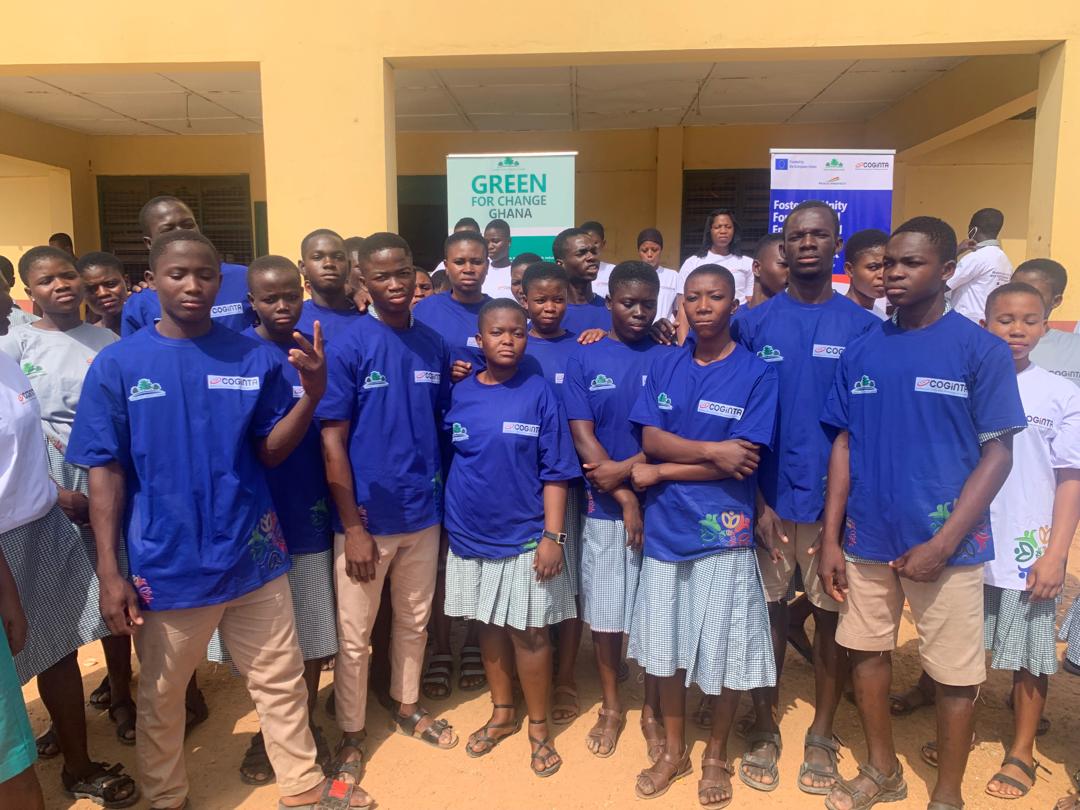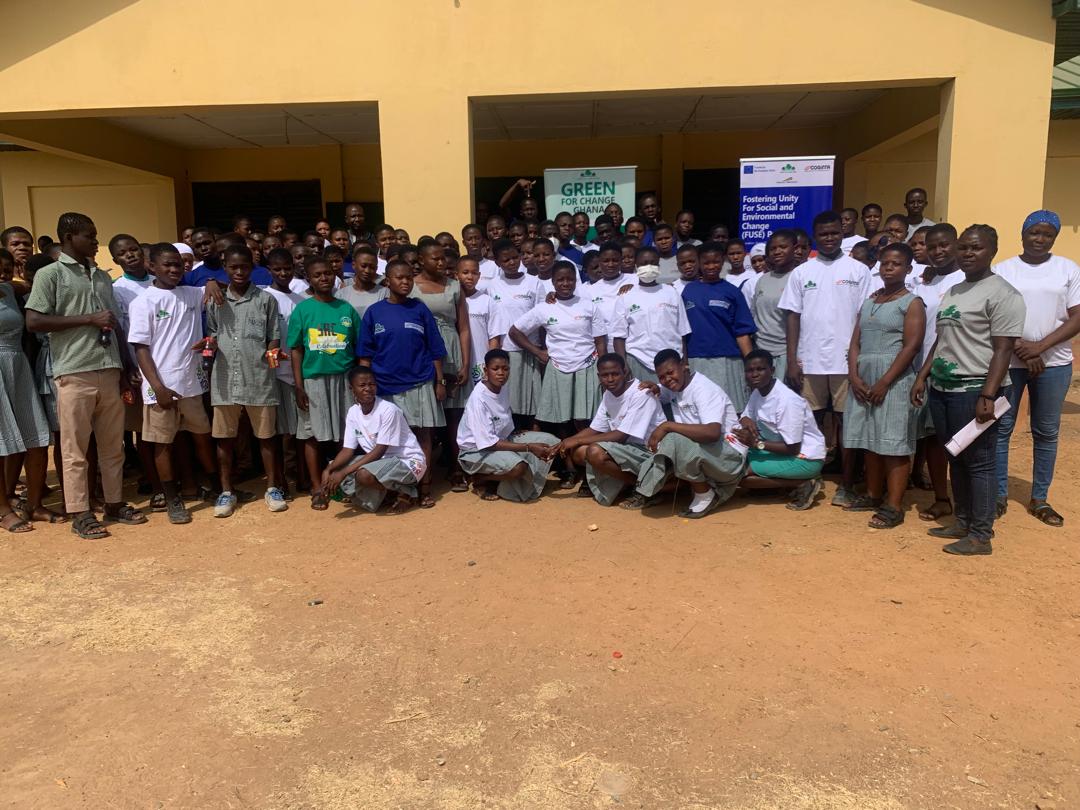

ADDRESSING BEHAVIORAL BARRIERS ASSOCIATED WITH TREE PLANTING (ABBAT)
Green for Change Ghana, in collaboration with Ranas Ltd, is implementing a landscape restoration initiative, the Addressing Behavioral Barriers Associated with Tree Planting (ABBAT) Project. The goal of this initiative is to enhance tree planting, nurturing, and protection efforts in the communities surrounding the Mole ecological landscape by applying behavior change strategies.
The project addresses the question: How can we ensure trees are planted in a way that gives them the best chance of survival? As part of this effort, Green for Change Ghana is working with farmers in 20 communities along the northern borders of Mole National Park. Over 62,000 tree seedlings have been distributed to 1,544 beneficiaries, each receiving 40 seedlings for planting in agroforestry systems.
Farmers have been trained on best practices for tree planting, orchard maintenance, and integrating behavior change techniques (BCTs) to improve tree survival rates. Monthly visits are conducted to support farmers, address challenges, and encourage discussions on how to improve the environment for future generations.
The ABBAT project is funded by the Swiss Development Cooperation (SDC) and the Audemars Watkins Foundation (AWF) for the baseline and implementation phases. The project commenced in August 2022 and will continue until December 2025. We are open to strategic collaborations and funding opportunities for the upscaling phase, which is set to run from 2026 to 2028.


BUILDING CAPACITY OF SMALLHOLDER CASHEW FARMERS ON HARVEST AND POST-HARVEST INCLUDING NUT QUALITY
Green for Change Ghana, with funding from USAID under the Feed the Future Ghana Trade and Investment (GTI) Activity, implemented a six-month project in the West Gonja Municipality titled “Building Capacity of Smallholder Cashew Farmers on Harvest and Post-Harvest Management, Including Nut Quality.” The project trained 300 cashew farmers on key silvicultural practices, focusing on harvest and post-harvest techniques. The training covered best practices for nut collection, post-harvest management, drying, storage, and assessing nut quality parameters, including KOR, moisture content, defective rates, and nut count.
Additionally, 30 lead farmers were selected from the group of 300 and received advanced training to help disseminate the knowledge throughout the community. This approach facilitated the long-term spread of skills and empowered local leaders to reinforce the concepts across the region. By adopting these improved techniques, farmers are expected to produce higher-quality cashew nuts, enabling them to negotiate better prices in the market.


RESTORING INDIGENOUS TREE SPECIES
(RITS) PROJECT
The self-funded Restoring Indigenous Tree Species (RITS) Project by Green for Change Ghana (GCG) is dedicated to restoring native trees in Ghana’s Savannah ecological zone. This area, home to climate-resilient species like Baobab, Kapok, Dawadawa, and Shea, has suffered extensive deforestation due to logging, agriculture, and charcoal production, resulting in habitat loss and environmental vulnerability. These indigenous species provide critical economic, medicinal, and environmental benefits to local communities.
GCG's RITS project aims to plant 500,000 native trees by 2028. So far, over 10,000 trees, including Shea, Baobab, Kapok, and Rosewood, have been planted across six communities in the West Gonja Municipality. These trees contribute to food and income diversity, climate resilience, and ecosystem balance. Through an agroforestry approach, GCG is also advancing Farmer Managed Natural Regeneration (FMNR), with a target to nurture 20,000 naturally growing saplings, especially Shea, to maturity.
A community-based nursery has been established in Damongo, with reliable water sources. GCG is currently seeking donor support to expand the nursery with essential materials, such as polypots and equipment, to achieve the 500,000-tree goal and enhance the livelihoods of local communities.


MOBILIZING VOLUNTEERS FOR COMMUNITY-BASED NATURAL RESOURCE MANAGEMENT (MOVE-CVN) PROJECT
With a grant from Star Ghana Foundation, Green for Change Ghana (GCG) is implementing the MOVE-CVN Project, a one-year initiative aimed at empowering community volunteers to protect Ghana's fragile woodland ecosystems and indigenous livelihoods from the threats of illegal logging and unsustainable charcoal production. The project will establish a network of 32 trained community volunteers dedicated to environmental stewardship, promoting sustainable practices, and contributing to the conservation and resilience of local ecosystems.
Volunteers will receive training on community engagement, the importance of forest conservation, patrolling of off-reserve areas, and alternative livelihoods such as honey and shea production. This initiative, running from June 2024 to May 2025 across six Savannah region communities, equips volunteers to work alongside Forestry Service Department supervisors to combat illegal activities such as logging and charcoal burning particularly using shea trees.


GREEN FOR CHANGE GHANA'S LAUDATO SI TREE PLANTING PROGRAM
Aligned with Pope Francis' Laudato Si program for environmental protection, Green for Change Ghana, in collaboration with Saints Peter and Paul Parish, Tamale, has launched a tree planting initiative across the Tamale Archdiocese. Over 1,200 tree seedlings have been distributed to parishioners, schools, and local communities, encouraging environmental stewardship and the greening of homes and public spaces. Participants have received comprehensive training in tree planting, water conservation techniques such as mulching, and drip irrigation, equipping them to care for the seedlings through dry seasons. Ongoing support includes regular monitoring visits, community sensitization, and plans for establishing conservation clubs in schools.
The project’s goal is to distribute 30,000 seedlings across 16 parishes by 2025, improving local ecosystems and combatting environmental degradation. Green for Change Ghana is seeking funding and partnerships to expand the initiative and establish a sustainable tree nursery, with a target of $50,000 in funding. Your contributions will support environmental sustainability, enhance climate resilience, and empower communities to take an active role in conservation efforts.


SUNRISE SPECTRUM INITIATIVE (SSI)
Green for Change Ghana, in partnership with Tangelic and Resolve36 (US-based organizations), has launched the Sunrise Spectrum Initiative (SSI) in northern Ghana. This project focuses on improving health outcomes and reducing carbon footprints by providing over 1,000 clean, solar-powered cookstoves to households.
SSI will also deliver solar electrification to underserved communities lacking access to electricity, enabling households to engage in more productive activities. The initiative aims to significantly reduce the time rural women and young girls spend gathering fuelwood or burning charcoal, which will also contribute to environmental conservation, improved health, and better educational outcomes.
In addition, the project will promote irrigation farming by installing solar-powered water pumps near reliable water sources, supporting dry-season farming. SSI will also power community centers, health centers, and schools, further benefiting local communities.


FOSTERING UNITY FOR SOCIAL AND ENVIRONMENTAL CHANGE (FUSE) PROJECT
Green for Change Ghana, in collaboration with Coginta and with funding support from the European Union, is implementing the FUSE Project in the Sawla/Tuna/Kalba District of the Savannah region, Ghana. This six-month pilot initiative which will run from December 2024 to May 2025, is dedicated to building peaceful, inclusive, and resilient communities by empowering youth to champion Gender Equality and Social Inclusion (GESI) while addressing the root causes of violent extremism and climate change.
The project goals are as follows:
1. Promoting Gender Equality and Social Inclusion (GESI): Enhance understanding and practical application of GESI principles among students at Sawla Senior High School.
2. Preventing Violent Extremism: Educate and engage youth in peace-building activities to reduce radicalization and minimize the appeal of violent extremism.
3. Tackling Climate Change: Increase awareness and student participation in climate change mitigation and adaptation activities.
The FUSE Project represents a significant step toward empowering youth as key agents of social and environmental change in their communities.
